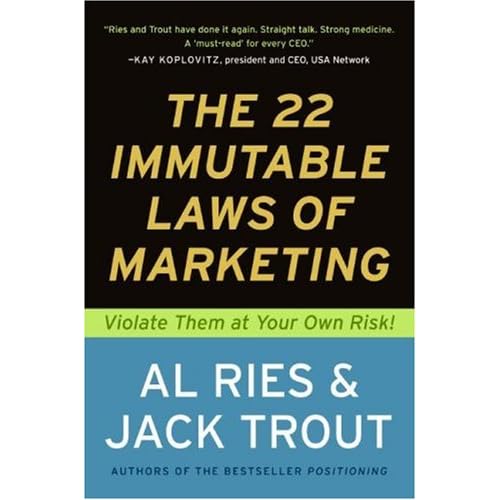 As part of the Monday Marketing series I've discussed branding as the concept applies to Indie Authors, from branding your tweets to staying true to the Company you want to keep.
As part of the Monday Marketing series I've discussed branding as the concept applies to Indie Authors, from branding your tweets to staying true to the Company you want to keep.If you're just joining the Webbiegrrl blizzard, I'm now going through The 22 Immutable Laws of Marketing, a book by Al Ries and Jack Trout, which I believe is one of the best little books ever written on the subject. It's only about 1/4" thick in paperback, so if you haven't read it already, take 5 minutes to read it now. I'll wait. All done?
This series will discuss how to apply these generic laws of marketing to the Indie Author activity, specifically. Our Digital Publishing industry has some unique quirks that widget-makers don't have to tackle. I've also combined some of the laws into pairs so this series will be less than 22 weeks long. If you'd like to have a copy of this material to refer to offline, please consider purchasing an edited version of this series as an eBook or paperback.
Chapter List for 22 Immutable Laws of Marketing (for Indie Authors)
(some chapters have been combined or eliminated)
Law 1: Law of Leadership
Law 2: Law of Category
Right from the start, we had to debunk the myths of Indie Publishing and book marketing. Click here to read why it is better to be first than it is to be #1--even on a best-seller's list.
Law 3: Law of the Mind
Law 4: Law of Perception (yes, they did coin the phrase perception is everything!)
As an Indie Author, you should be familiar with the idea of taking control of your reader's mind and planting an idea into it. That's what storytelling is all about, isn't it? That's also the secret behind these two laws of marketing. Read here about how to explode, fully-formed, into your prospect's mind and own that virtual space.
Law 5: Law of Focus
Law 6: Law of Exclusivity
The Law of Focus goes back to the basics. Read here why it is not wise--or profitable--to try to be all things to all readers. Or if you do branch out beyond your primary genre, use a pen name and let that new "persona" become a newly-focused brand. Since fiction is not widget-making (and there really are only 5 stories humans tell, and retell, again and again), the Law of Exclusivity doesn't really apply to Indie Publishing.
Law 7: Law of the Ladder
Ladders of sucess aren't bought and sold--they're created in the minds of customers. Read here how to get onto a prospect's ladder, then climb it!
Law 8 Law of Duality
Is every market always a 2-horse race? Read here to find out--and learn what to do when you're stuck at #3--or for Indie Authors, #300 and you want to get to #299, one step (or ladder rung) at a time.
Law 9 Law of Opposites
In Indie Publishing there are always dozens or hundreds of new alternatives showing up daily, above you in the rankings. Read here to learn how to become just what the market needs to reject whomever's above you on the product ladder you're climbing.
Law 10 Law of Division
Because it's not always about two titans battling it out, the Law of Division looks at how to break the equation down into bite-sized pieces.
Law 11 Law of Perspective
Sometimes you have to step back to see the Big Picture. The Law of Perspective instructs you to look at your marketing plan with the long term in mind--using the short term strategies discussed in the first 10 laws.
Law 12 Line Extension
According to the Law of Line Extension, crossing genre lines and expanding your reach is bad. In fact, that's true--to a point. You can create a new brand for the new genre. That's the unique and special feature of our industry that widget-makers cannot enjoy. Click through to read more about how to spin off into new genres without diluting your existing brand.
Law 13 Law of Sacrifice
Check out these 3 things you can give up to get more out of your marketing efforts.
Law 14 Law of Attributes
For every product attribute, there is an opposite and equally-effective attribute. Related to the Law of Opposites (Law 9), this Immutable Law of Marketing zeroes in on an effective sales tool you can use to make your own secret weapon.
Law 15 Law of Candor
Being open and honest can give you immediate access to a customer's mind, allowing you to own that space first, converting your "one word" or strongest attribute into an exclusive positive. Law 15 explains how to turn a negative into a powerful positive. Click here to read about the Law of Candor.
Law 16 Law of Singularity
Tying together the last several immutable laws, the Law of Singularity says that given any marketing situation and set of choices, you'll always have one path or action which will yield far greater results than any other. Finding that one path is the key. Using the preceding 15 lessons is the method.
Law 17 Law of Unpredictability
No plan survives first contact with the enemy and the Law of Unpredictability shows you how to avoid the mistake of thinking otherwise. Click here to find out more.
Law 18 Law of Success
Law 19 Law of Failure
It might seem strange to bundle these two together, but as it turns out, they are two sides of the same coin. How you view your current position, your past and your future are all tied together. Click here to read more.
Law 20 Law of Hype
Are you buying into your own hype? Don't. Click here to read why a successful shelf life depends on staying in touch with reality. Learn the Law of Hype--when and how to use it.
Law 21 Law of Acceleration
Find out why moving too quickly can kill your joy ride. I happen to love a fast car and slow--um, well, some things in life are to be savored, not rushed. The Law of Acceleration describes how and why your writing success is one of them. Click here to read more.
Law 22 Law of Resources
We afford what we want to afford. It's always a choice how you spend your money, your time, your energy. They say that a mediocre idea, with sufficient backing, will find greater success than a great idea with no backing. Click here to read about how I advise you apply the Law of Resources to make your Indie Publishing career a success.


